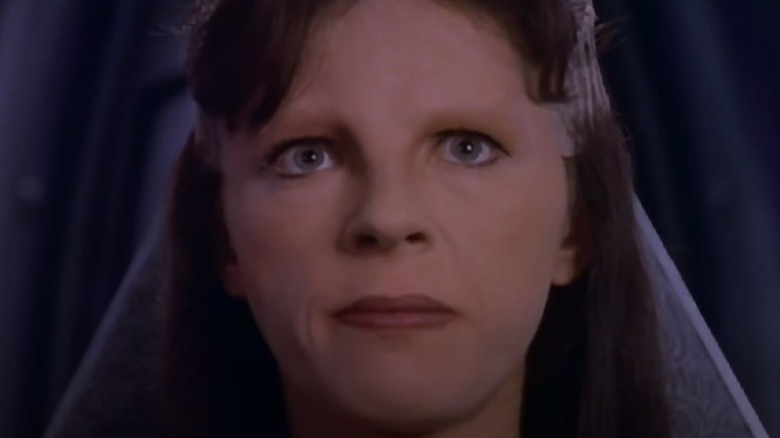
"Babylon 5" is on its way back, and that's a big deal for science fiction. Fans fell in love with creator J. Michael Straczynski's experiment, a five year mission to tell one epic tale in a way that no other television series had yet accomplished. It paved the way for future successes like "Westworld," "LOST," and "Battlestar Galactica." It was an ambitious project for Straczynski, a screenwriter who's already made our childhoods special with "He-Man and the Masters of the Universe" and "The Real Ghostbusters."
Babylon 5 is a space station anchored in neutral territory, a place where ambassadors from across the galaxy can meet in relative peace. As the series opens, humanity is recovering from a war that nearly wiped them out. The future of our kind rests on the success of this diplomatic experiment, frequently teetering at the edge of failure. The show ruminates on the aftereffects of war, never shying away from studying the heavy guilts of survival, nor the spiritual comfort of hope. Its cast featured some of the best and most underrated TV actors of its time, from Mira Furlan and Bruce Boxleitner, to Bill Mumy and Walter Koenig.
Before the series is reborn, it's definitely worth it to check out the original. Streaming in its entirety on HBO Max, "Babylon 5" may seem daunting to newcomers. That's why we're providing a quick overview of the series, including a look at its biggest themes, its spinoffs, and its legacy.
Season One: Signs And Portents
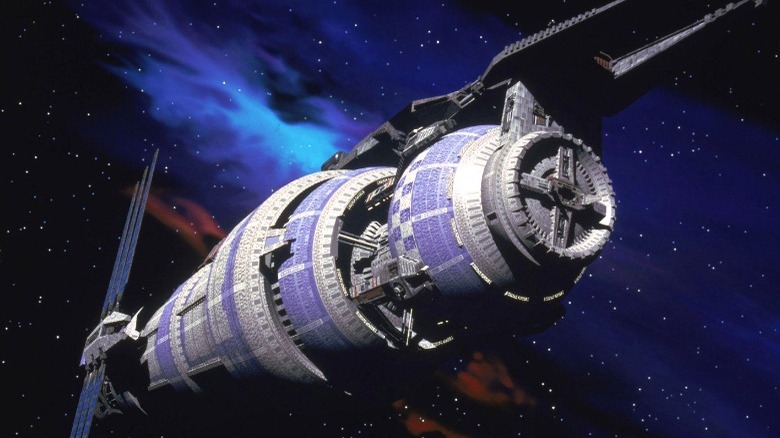
The first season of "Babylon 5" introduces the station and its mission, digging deep into a galaxy exhausted by war but not convinced by promises of peace. Paranoia fuels many of its stories, and it's tempered by the theme of exploration -- not of space, but of people unlike ourselves. It's anthropological science fiction at its finest.
The Babylon stations were commissioned after the end of the Earth-Minbari war to provide neutral territory. Three are sabotaged before completion. A fourth mysteriously disappears. Babylon 5 comes online without major incident, helmed by Commander Jeffrey Sinclair (Michael O'Hare). He's a survivor of the Battle of the Line, the final skirmish between humans and Minbari. Sinclair must help to build a lasting peace with the Minbari, an elf-like species with a rigid caste system and sometimes impenetrable ethics. Sinclair can't trust them, because he can't trust himself. There's a memory missing from his final battle, and the Minbari and their ambassador, Delenn (Mira Furlan) are cagey about the truth.
Babylon 5 provides the Centauri and the Narn, along with countless other species, a chance to fight for peace instead of war. The Centauri, Romanesque, colonialist, and elite, were humanity's first allies in space. The Narns are hardy spiritualists, reclaiming their identity after centuries of Centauri slavery. But all these efforts are undermined by an unexpected pincer attack. Earth's new peace is upended by political assassination, and a shady figure named Morden infiltrates the ambassadors.
Season Two: The Coming Of Shadows
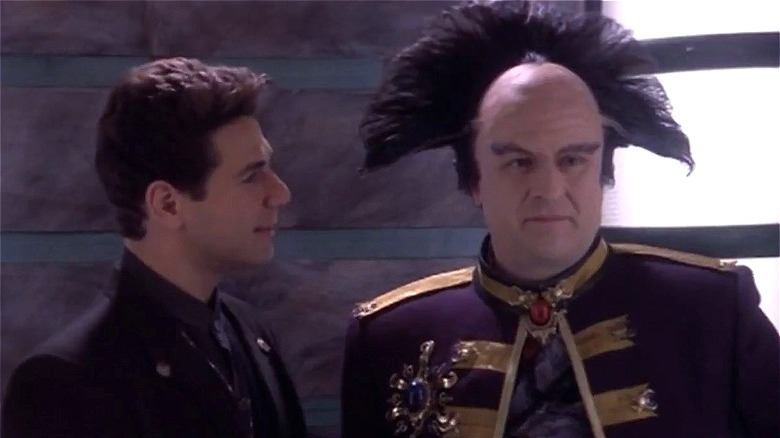
Season Two is a season about change and the dread that can follow. The Minbari ambassador Delenn is the heart of this conflict, with her attempt to become a physical bridge between her culture and ours creating a schism in her homeland. Commander Sinclair is abruptly transferred away, and the new leader of Babylon 5 is John Sheridan (Bruce Boxleitner). The militant Sheridan's appointment by the new Earth president doesn't sit well with Minbar at first, but Sheridan has ambitions of his own.
Meanwhile, Morden's inroads with the ambassadors on behalf of a mysterious alien race builds to the brink of a new war between the Narn and Centauri. The goals of Morden's masters are unclear, but still not as vague as the Vorlon ambassador's efforts to get to know Sheridan. Pieces are moving towards a conflict that would dwarf what the galaxy has known, and one of the biggest is the mystery of what actually happened to Babylon 4.
There are some strange episodes in this season, but it's a rewarding watch after the rough and thinly budgeted premiere season. Where the first year provides the bedrock, the second is where you're either long since hooked, or know it's not for you.
Season Three: The Point Of No Return
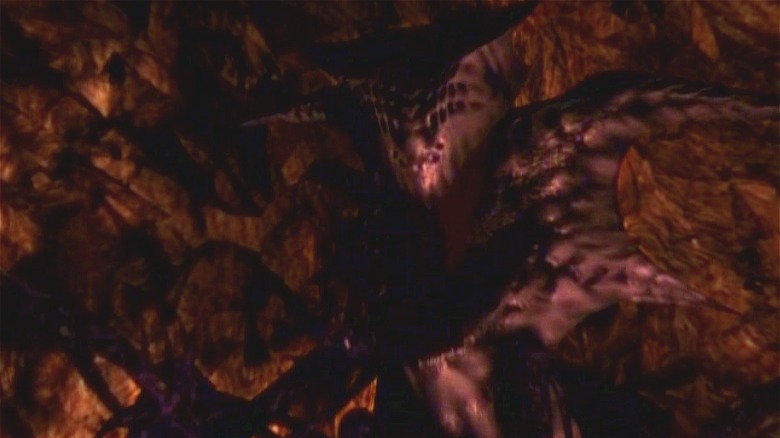
"Babylon 5" spends its third year devoted to conflict. The Shadow War is no longer in those shadows, and the forces of light are arrayed openly against it. Thoughtless Centauri greed has returned them to the height of their power, and their new emperor, Cartagia, is a hedonistic torturer. The Narns are reduced again to slavery, and even humanity is teetering towards some inner brink. President Clark is an eerie figure, a cunning, power-hungry creature that's all too familiar. His Night Watch initiative, unsettling to watch today, becomes an Us vs. Them militant organization -- a thought police allied to a very literal thought police, the Psi Corp.
"Babylon 5" rarely spares its audience the costs of war. The previous year was foreshadowing, even including an unflinching look at the aftermath of an out of control pandemic. Now all its characters are undergoing radical changes of their own, with even the Centauri Vir speaking up in order to challenge the horrors his people are inflicting on the Narn. But there's no easy answers, no quick forgiveness. The sacrifices made this year matter, because they'll also lead to hope.
Season Four: No Surrender, No Retreat
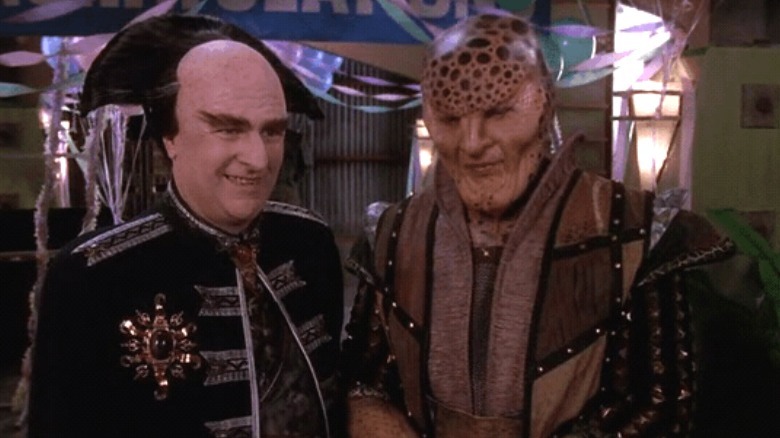
There was a deliberate choice to leave the previous season on a cliffhanger. It's a moment that makes it clear that the great war is won, but how much it will cost the alliance is in doubt. That sets the tone for the fourth year of "Babylon 5," and where many epics will end on a triumphant note, this series is now just past the halfway point. This year is an unflinching look at the power struggles that take root in the vacuum left by an empire's fall.
Coming to the fore is Earth's struggle with its identity. President Clark's racist, authoritarian regime is reaching its climax, empowered by the Psi Corp's ambitions and the tools the Shadows have left behind. The new fight is within, and it's just as fragmentary and complex as the Shadow conflict. Other factions must also choose their new paths; most poignant of these are the Narns. After a century of war and slavery, their ambassador, G'Kar (Andreas Katsulas) is the heart of their spiritual struggle. A first-hand survivor of Centauri cruelty, it's up to him to ensure his people don't inherent the Centauri's mistakes.
This season was nearly the last, and its final episode, "The Deconstruction of Falling Stars" is a strange, anthological glimpse of the future. Fans wanting to follow the series to its intended end in season five can choose to leave this odd episode for a finale watch party.
Season Five: Wheel Of Fire
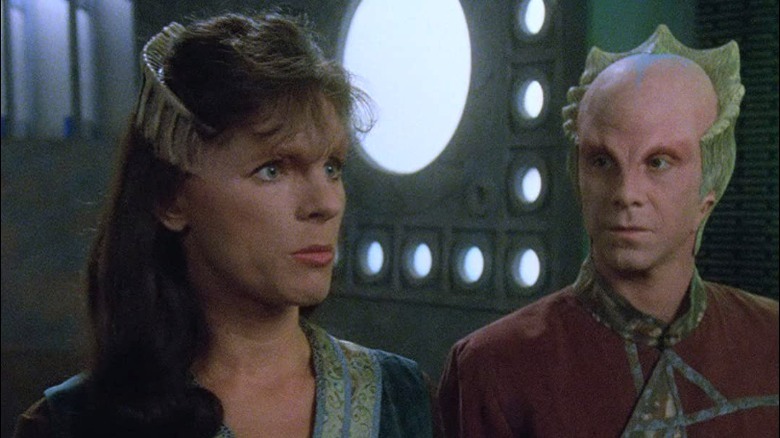
Season Five exists as a behind-the-scenes miracle, but that survival leaves some of its stories truncated and its cast fractured. The station is now under the control of Captain Lochley (Tracy Scoggins), an Earth loyalist chosen for her viewpoint, her connection to Commander Sheridan, and a willingness to listen. The survivors of the war are in the process of building a new alliance, yet the same struggles and distrust that fostered the great war remain. Gradually the new alliance realizes that the Shadows left allies behind, younger but powerful races determined to cling to survival at any cost.
The Centauri are a key focus, alongside a sometimes ineffective story about the roots of a war to come between the telepaths that ran from the Psi Corp and the rest of humanity. The themes here, while they often echo the anthropological introspection of the first season, also show that the roots of conflict can never be truly squashed. The series, however, ends with hope -- showing the future of our beloved characters in a more humane, less distanced way than the previous year.
The Babylon 5 Movies
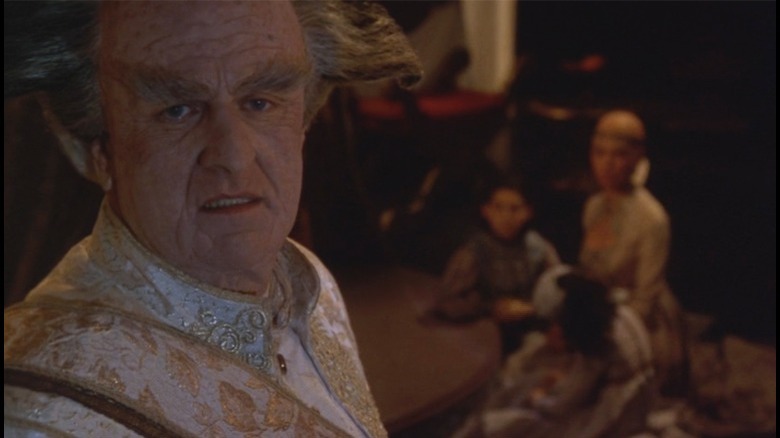
For how rough and tumble "Babylon 5" was at first, it can be a surprise to find out it did well enough to allow for several spin-off and tie-in films. For fans looking for the complete experience, this is where the difficulty starts. The original pilot film "The Gathering" is available on HBO Max, listed as the first episode. It contains plot points that the series will come back to down the line, making it a useful watch so long as you're ready for some early installment weirdness. The rest are only available on out-of-print DVD collections, a victim of the channel hop "Babylon 5" endured to survive.
One film, "In The Beginning," is worth seeking out after a series binge. It takes a broad look at the events of the series through the eyes of Londo Mollari, now the aging Emperor of Centauri Prime. It's a bittersweet farewell, expanding on events that were only mentioned elsewhere. "River of Souls," with Martin Sheen in rare alien fit as a Soul Hunter, is a post-Season 5 tale of mortality and ethics, strictly for die-hards. "Thirdspace" is more interesting, containing a glimpse of pure eldritch horror twined neatly with its space opera setting.
"Legend of the Rangers" is a curio, a remnant of a spin-off project that didn't get off the ground, and is safely skippable. "A Call to Arms" is useful viewing if one wants to try out the spin-off that did get a shot, "Crusade." It helps to set the stage for the return of the technomages seen briefly in the main series, while introducing the deadly plague the crew of "Crusade" are charged with ending.
Babylon 5's Crusade
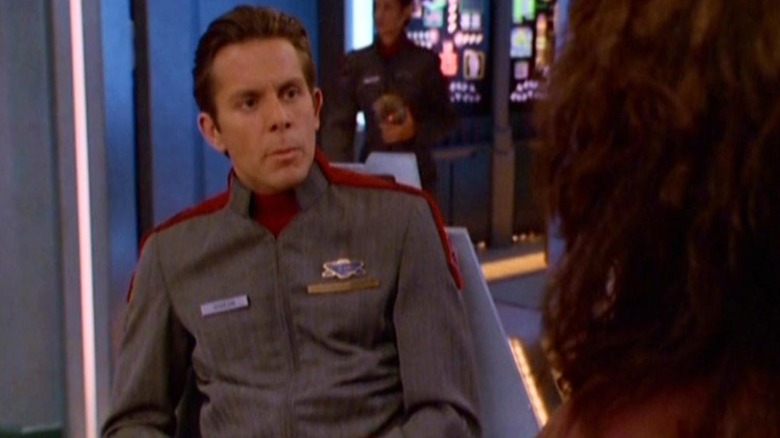
A 1999 spin-off, "Crusade," lasted for only thirteen episodes, killed by internal conflict (as documented by the Pittsburgh Post-Gazette) and unable to find a home on the Sci-Fi Channel. Intended to be another five year story, the crew of Earthforce vessel Excalibur must seek a cure for the genocide bug threatening all human life on Earth. It attempted to look at the long strife between these now-doomed Earthers and the Mars-born human colonists who finally won their independence during the course of "Babylon 5." The looming threat of the Telepath War, introduced in truncated form during the mothership series run, was also intended to be a focus.
Difficulties behind the scenes changed a number of these plans, with TNT mandating costume and visual changes that forced the series into a filming hiatus to accommodate them. The series also aired out of intended order, leaving even die-hard fans of the franchise confused. While "Crusade" can be found on some streaming services, excluding HBO Max, it's recommended only for curiosity's sake, and after consulting a viewing order recommendation list.
The Written Universe
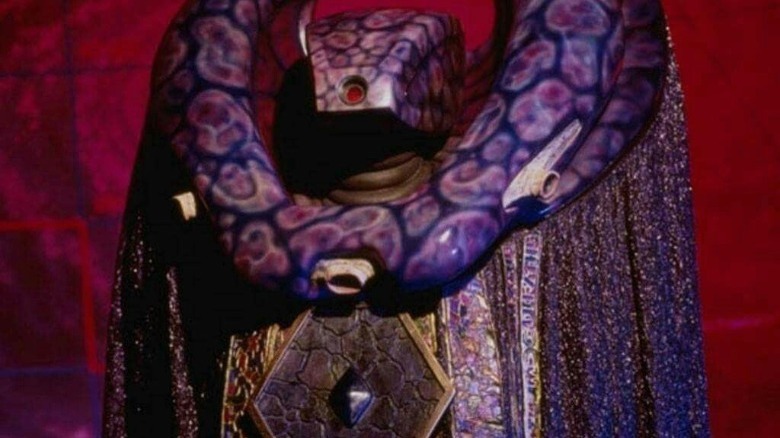
"Babylon 5" is unusual among other franchises in that a majority of its tie-in books and graphic novels are regarded as canon by its creator, who typically provided outlines and guidance. DC Comics published fourteen issues covering four brief storylines, but the collections are fractured and now out of print. One collection was only printed by Titan Books in the UK, and the individual issues, some of which were written by comic legend Peter David, are now rare.
The novels are easy to find secondhand, but also still out of print. Unfortunately, they have not yet been uploaded to eBook services. Nine standalone novels were written, two are canon. "To Dream in the City of Shadows" visits with Ranger Marcus Cole, exploring his backstory and the guilt that drove him to join the secretive Human-Minbari sect. "The Shadow Within" explores the first human expedition to Z'ha'dum, with a crew that includes a melancholy archaeologist named Morden. Also canon are the miniseries trilogies. "The Psi Corp Trilogy" is the best of these and shows the fate of the manipulative Psi Cop Bester. "Legions of Fire" tells Emperor Londo's experience under Drakh control, and "The Passing of the Techno-Mages" does what it says on the tin.
Babylon 5's Online Impact
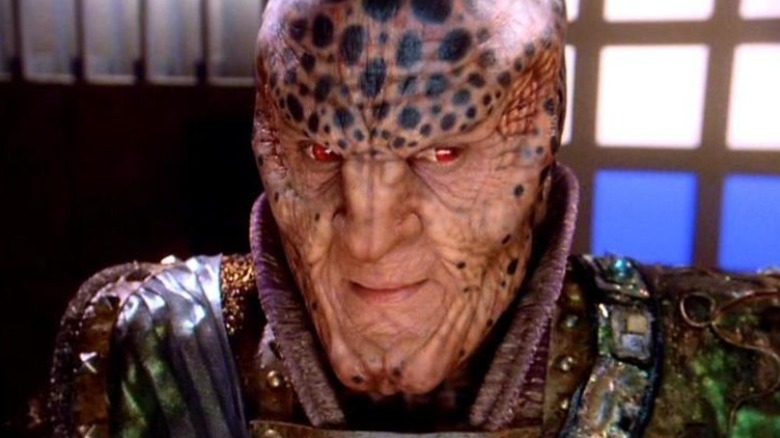
"Babylon 5" first aired in 1994, coinciding with the growing rise of the public Internet. Usenet and LISTSERV mailing lists made it easier than ever for a fandom to create collective spaces to discuss their new obsession. While musician David Bowie was arguably the first to harness the Internet in a unique way, J. Michael Straczynski and his embrace of the new online culture premiered how we interact with creators today on Twitter and Instagram. Participating freely in Usenet discussions, Straczynski provided an almost-live glimpse behind the scenes, discussing the work that creating a show of this magnitude required and answering fan questions.
"Babylon 5" was foundational for acknowledging the dedicated work of its fanbase, with Warner Bros hiring from within that base to help curate official websites, and even encouraging fanart. While the impact of fandom isn't new to science fiction, with "Star Trek" saved more than once by dedicated fans, "Babylon 5" helped to make it part of today's mainstream experience. Straczynski is still communicating with fans via Twitter, suggesting that the upcoming reboot will be just as connected to the online experience as it was twenty years ago.
Babylon 5's Inspirations
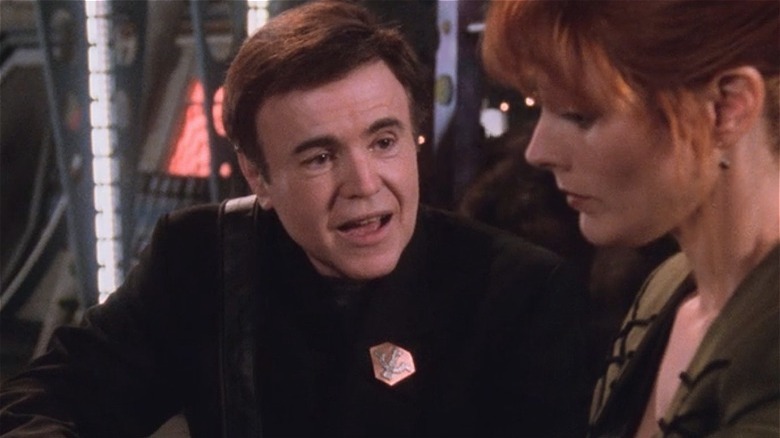
"Babylon 5" is a loving homage to the ideas of big science fiction, resting on solid old foundations. With Harlan Ellison on board as a creative consultant, the series took old tropes in new directions. One of the oddest connections here is an homage to an Ellison story called "The Prowler in the City at the Edge of the World." Found in the "Dangerous Visions" collection, Jack the Ripper becomes a plaything to amoral aliens. In "Babylon 5," Jack appears as a plaything to the equally inscrutable Vorlons, acting as their Inquisitor. It's a strange, ironic fate for Jack, and just one of the weirder places the series is happy to explore.
The legacy of author Alfred Bester is also a focus here. Hugo Award-winning novel "The Demolished Man" posits a telepathic future much like the one shown in the series, with the greatest crimes punished by psychic torture -- the death of personality. It's an ethical horror explored more than once in "Babylon 5," and the author lends his name to the sadistic Psi Cop Bester for cheeky reason.
"The Lord of the Rings" is also a reference guide to the epic themes of this series, with its broad themes of Dark versus Light, nature versus industry, and even the depths of love between the brief and the immortal finding a home on the Babylon station. It's a knowing wink behind naming a character Lorien. Here Tolkien's master of spirits is exactly that. He's terrifyingly ancient, yet compassionate enough to teach our young race the value of our brief lives.
A New Era Begins

Since "Babylon 5" ended, Straczynski remained a creative force. He wrote for Marvel Comics for several years, including an acclaimed run on "The Amazing Spider-Man" with John Romita Jr, and is currently writing for AWA Studios, a new comic imprint founded by former Marvel alums. In 2008, he wrote the script for "Changeling," a period crime drama starring Angelina Jolie and directed by Clint Eastwood. In 2015, he joined with the Wachowski sisters to create the acclaimed Netflix cult SF hit "Sense8." He's also a novelist, with the wrenching but delightful "Together We Will Go" becoming a recent bestseller.
The word that "Babylon 5" would be rebooted came on September 27th, with Straczynski confirming the news via Twitter. Due to launch on The CW, the descendent of the now-defunct PTEN channel that first aired the series, Straczysnki is at work preparing the pilot episode. A ground-up remake, it's unknown what storylines will return and what they'll look like. Straczysnki has spoken about his intent for the remake, reflecting on the effects of time and change on the stories we write. What the new "Babylon 5" looks like won't be what we grew up with, and that's important to keep in mind.
Good science fiction is almost always a response to the world around us. "Babylon 5" didn't shy away from the isolationist fears of the '90s, and today's social landscape is prime territory for an even more harrowing look at fascism and conflict. With a broad variety of stories informing Straczynski's work since "Babylon 5" went off the air, what comes next is already highly anticipated by fans, and hopefully, will find an even bigger audience this time around.
Read this next: Star Trek: The Next Generation's 10 Best Episodes
The post Babylon 5: What New Fans Need to Know Before the Reboot appeared first on /Film.
0 Commentaires